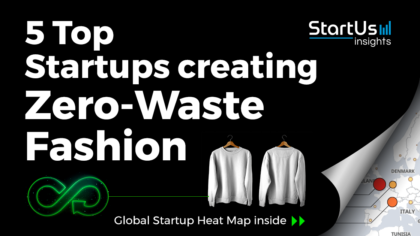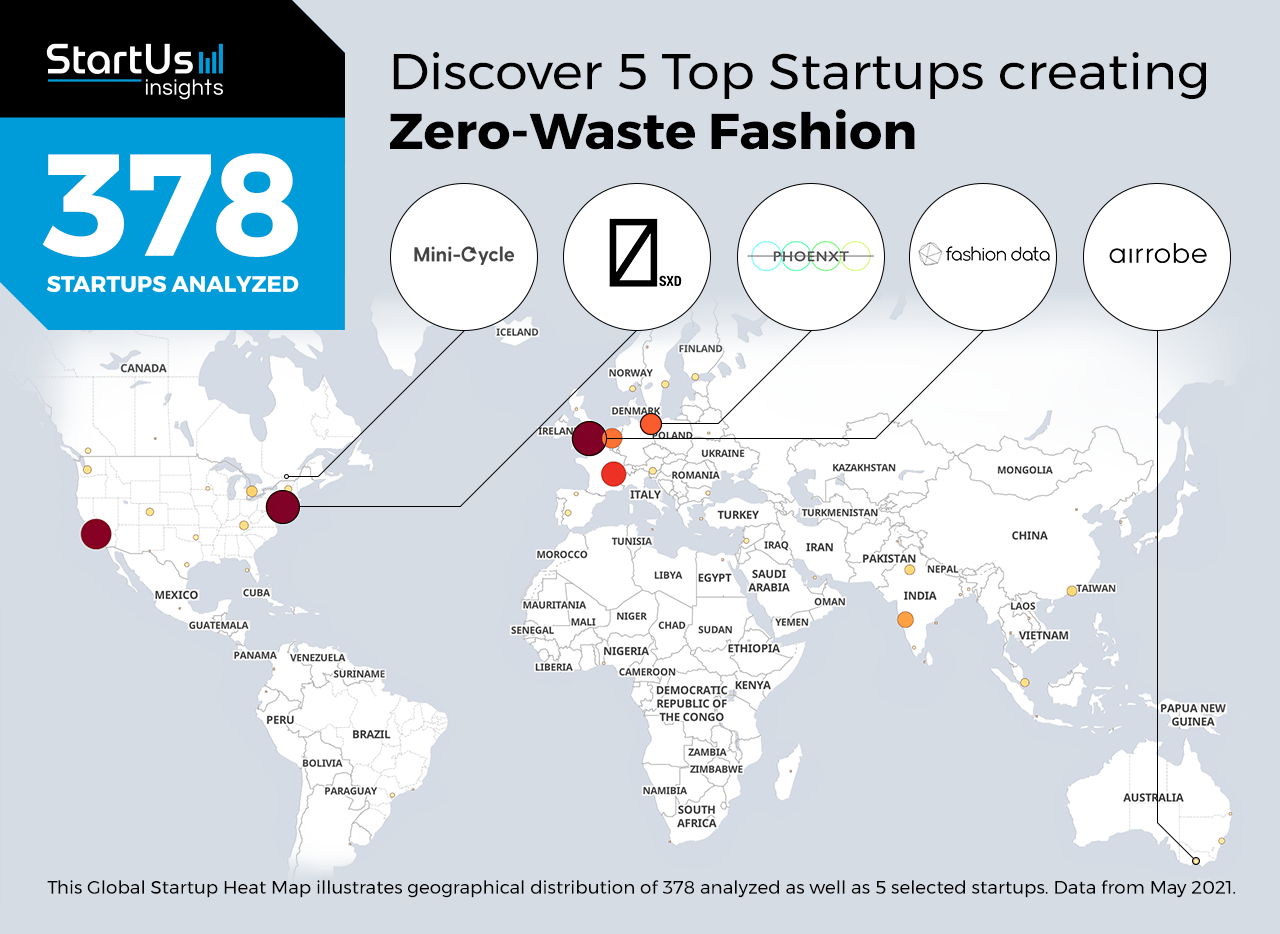Accelerate Productivity in 2025
Reignite Growth Despite the Global Slowdown
Staying ahead of the technology curve means strengthening your competitive advantage. That is why we give you data-driven innovation insights into the circular economy industry. This time, you get to discover 5 hand-picked zero waste fashion startups.
Global Startup Heat Map highlights 5 Top Zero Waste Fashion Startups out of 378
The insights of this data-driven analysis are derived from the Big Data & Artificial Intelligence-powered StartUs Insights Discovery Platform, covering 2.093.000+ startups & scaleups globally. The platform gives you an exhaustive overview of emerging technologies & relevant startups within a specific field in just a few clicks.
The Global Startup Heat Map below reveals the distribution of the 378 exemplary startups & scaleups we analyzed for this research. Further, it highlights 5 startups that we hand-picked based on criteria such as founding year, location, funding raised, and more. You get to explore the solutions of these 5 zero waste fashion startups & scaleups in this report. For insights on the other 373 zero waste fashion solutions, get in touch.
Phoenxt recycles Textile Waste into New Materials
While virgin material production incurs heavy costs and time, a large fraction of them still ends up in landfills. The textile recycling process enables material recovery from discarded clothes. According to the USPEA, almost all of the post-consumer textiles are recyclable or reusable. Materials extracted from recycled textiles also reduce the raw material cost for cloth manufacturers while contributing to the environment. This is why startups develop solutions to help textile companies reuse materials.
German Startup Phoenxt fills this textile to fabric recycling gap by introducing solvent-free fiber separation technology. It provides solutions to major problems like poor recycled fabric quality, pre-consumer non-recyclable wastes, and carbon dioxide (CO2) emissions. The startup closes textile-to-textile recycling loops by producing high-quality fabrics from textile waste. This benefits textile manufacturers in procuring cost-efficient fabrics from the waste.
Fashion Data provides a Data Intelligence Platform
Be it product, supply, store, or customer, every sector of the fashion industry generates a huge amount of data. Data intelligence techniques derive useful insights from the data to optimize the process, generate real-time updates and enable intelligent zero waste decision making. Inadequate information about product demand and available stock leads to store cluttering. Artificial intelligence (AI) algorithms help companies understand customer buying patterns and optimize choices for cloth manufacturing. Common dashboard ensures product availability and counts at any point in time. Hence, startups are developing software to provide data-related services to the fashion industry.
French startup Fashion Data provides data intelligence services to all stakeholders across the value chain of the fashion industry. The company reduces wastage by optimizing the number of products in-store, predicting order patterns, and forecasting sales volume data for storekeepers and manufacturers. Smart algorithms detect consumer trends to keep the customer updated and drive repeat orders. The reduced wastage also leads to cost reduction for everyone in the value chain and makes textile operations easier.
Mini-Cycle enables Post-Consumer Trading and Upcycling
Textile recycling includes the recovery of discarded clothes for reuse. The average life cycle of a piece of clothing is roughly three years. However, with fast fashion trends, consumers trash out a million tons of clothes before they mature. The majority of these clothes end up in landfills, rather than being reused, majorly due to the lack of incentives. To this end, startups come up with new ways to promote post-consumer recycling.
Canadian startup Mini-Cycle encourages apparel reuse by enabling post-consumer apparel trading. The brand sells both new and recycled kids’ apparel. Post-sales, the brand’s buyback program allows the parents to trade in the used clothes within 2 years with a considerable payout. The startup then upcycles the cloth either by refurbishing it or by using it in other upcycled products before reselling it to other parents. The circular model ensures profits and reduces waste for both the company and users.
Air Robe creates Virtual Circular Wardrobes
The majority of consumers are oblivious to the impact their purchases have on the environment. Also, consumers trash the majority of the clothes they buy as they are unaware of their potential resale value. Virtual circular wardrobes mimic the items of an actual wardrobe and enable buyers to track their purchases and later derive value from them by reselling them through online platforms. Startups are developing online fashion marketplaces to enable transparent reselling and make the consumers’ wardrobes more circular.
Australian startup Air Robe develops an online platform that allows consumers to keep track of their wardrobe content. Online purchases with Air Robe’s partner brands reflects on the personal virtual wardrobe, with metrics depicting their environmental impact. It encourages resale and repurposing of post-consumer clothes by revealing their market value in real-time. In addition, the circular wardrobe benefits brands in cause-marketing and earning customer loyalty. The startup’s solution declutters the consumers’ wardrobe while keeping textile trash away from landfills.
Shelly Xu designs Zero Waste Garments
With increasing demand, the fashion industry generates tonnes of fabric waste during garment production. The root cause of the majority of this waste lies in the garment design. Regular designs underutilize the textile and bring out waste during production. Zero waste designs produce little to no textile waste during garment production by implementing a selective pattern approach. Many companies are implementing zero waste designs to reduce wastage.
US-based startup Shelly Xu creates zero waste garment design and also produces garments with the waste left by the fashion industry. The designs offer flexibility to the buyers to cope with their changing physiques to last longer in the wardrobe. The startup creates versatile and functional pieces of garments that not only look good but generate negligible waste. Moreover, the startup delivers the product using reusable packaging. Zero waste design is gaining popularity among designers also due to the consumer preference shift to environment-friendly designs.
Discover more Sustainable Startups
Sustainable startups such as the examples highlighted in this report focus on biotextiles, upcycling, as well as sustainable manufacturing. While all of these technologies play a major role in advancing the circular economy, they only represent the tip of the iceberg. To explore more technologies, simply get in touch to let us look into your areas of interest. For a more general overview, you can download one of our free Industry Innovation Reports to save your time and improve strategic decision-making.



![Explore the Top 10 Waste Management Industry Trends & Innovations [2025]](https://www.startus-insights.com/wp-content/uploads/2025/06/Waste-Management-Industry-Trends-SharedImg-StartUs-Insights-noresize-420x236.webp)




